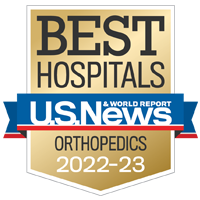
Meniscus Tear
Meniscus tears are among the most common knee injuries, affecting approximately 1 million people in the U.S. each year. A healthy knee joint contains two meniscuses, C-shaped structures made of cartilage. The one on the inside of the knee is the medial meniscus; the one on the outside is the lateral meniscus. Smooth, flexible and rubbery, they provide stability and shock absorption for the precious knee cartilage lining the joint, known as the hyaline cartilage. The meniscus is essential to the health of the knee and particularly to preventing arthritis, which occurs if the hyaline cartilage is damaged or lost.
There are two types of meniscus tears: acute tears, which result from a sudden injury (trauma) to the knee, and degenerative tears, which develop over time. While both types affect the integrity of the meniscus, they're treated differently. An acute tear may happen during sports or an event in which the knee is twisted. Acute tears frequently occur in combination with other knee injuries, specifically with anterior cruciate ligament (ACL) tears. For many acute injuries, surgical treatment is considered.
A degenerative meniscus tear is more subtle, developing gradually as the hyaline cartilage and meniscus deteriorate in quality and thin with age. Often these tears go unnoticed until the tissue has degenerated a good deal, and therefore surgical repair isn't appropriate. A deteriorated meniscus may suddenly tear, however; in this case, it may be reasonable to consider surgical intervention.
Our Approach to Meniscus Tears
At UCSF, we have world-class experts with advanced training in knee care and surgical techniques for the meniscus, as well as researchers actively working to improve therapeutic techniques. We are committed to helping patients return to the highest level of activity possible. Our team includes orthopedic surgeons, primary care sports medicine doctors, physical therapists and athletic trainers. When surgery is appropriate, we determine the best approach for each patient and use advanced minimally invasive techniques. When repairing the meniscus is no longer an option, we also have experience in meniscus transplant surgery.
Awards & recognition
-

Among the top hospitals in the nation
-

One of the nation's best for orthopedic care
UCSF Health medical specialists have reviewed this information. It is for educational purposes only and is not intended to replace the advice of your doctor or other health care provider. We encourage you to discuss any questions or concerns you may have with your provider.





